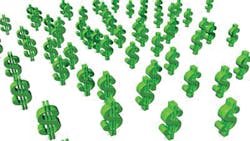What did Marie Antoinette, Mary Todd Lincoln, William Randolph Hearst, Jacqueline Kennedy Onassis, and Princess Diana all have in common? They all had episodes of excessive and often senseless spending that contributed to their financial downfall, personal problems, or even death (Marie Antoinette)
Oniomania is a mental health disorder related to the compulsive desire to shop. This disorder is more commonly referred to as compulsive shopping, shopping addiction, shopaholism, compulsive buying, mall mania, or Sushma Syndrome. Omniomania is not a rare, new, or designer disease. It is estimated that 6-10% of the US population are compulsive shoppers. The disorder starts in the late teens - early twenties and is chronic. It is believed to be more common in women than men.
What is the difference between a “shopaholic” and a “collector”? Gender. In order of preference, most female compulsive shoppers buy clothes, shoes, jewelry, and makeup. Whereas most male “collectors” buy clothing, shoes, electronics, and hardware. It is important to remember that compulsive shoppers are not always just buying “things”. There are plenty of compulsive over-spenders who splurge on events; splurging on dining out, vacations, theatre/concerts, hosting parties, beauty services, etc. Anyone can be a compulsive shopper, even cops.
Compulsive shopping disorders are not as easy to spot as you might think. Omniomania is a socially reinforced behavioral addiction. We are bombarded by advertising, telling us that buying will make us happy. Politicians encourage us to spend as a way to boost the economy. And we all want to have what those around us have. Consumerism has become a measure of our social value.
Normal Shopping vs. Shopping Addiction
What is the difference between normal shopping, occasional splurges, and shopping addiction? In the United States and other developed countries, shopping is a major pastime. Frequent shopping in and of itself does not support a diagnosis of a compulsive buying disorder. Normal buying can have a compulsive quality, particularly around special holidays or birthdays. Individuals who receive a significant pay raise, an inheritance or win a lottery may experience compulsive shopping sprees as well. Additionally you can buy, after all, without shopping; or shop without buying.
One of the defining characteristics of any addiction is that when the activity (vice) clearly has a negative impact on other areas in a person’s life, he/she is unable to control or stop the activity (vice). Alcoholics can’t stop drinking, drug addicts can’t stop using, compulsive gamblers keep on betting, over-eaters binge, etc. Compulsive shoppers keep on spending. It is estimated that 20+ million Americans can't control their urge to shop, even at the expense of their job, their marriage, their family and their finances.
So, Are You a Compulsive Shopper?
Answer often, sometimes, rarely, or never to each of the questions in this quiz developed by Olivia Mellan
- Do you buy things you want (not need), whether or not you can afford them at the moment?
- Do you have trouble saving money? If you have a little extra available to save or invest, do you tend to think of something you'd rather spend it on?
- Do you buy things to cheer yourself up or to reward yourself?
- Does more than a third of your income, not including rent or mortgage payments, go to pay bills?
- Do you juggle bill paying because you always seem to be living on the edge, financially?
- Do you tend to keep buying more of your favorite things even if you don't have a specific need for them?
- If you have to deny yourself or put off buying something you really want, do you feel intensely deprived, angry or upset?
If you answered often or sometimes to four or more questions, you're probably a compulsive spender, especially if you answered affirmatively to #7.
Characteristics of a Shopaholic
- Have a preoccupation with shopping
- Have low self-esteem; feel insecure
- Shop to feel relief from pain, anxiety or depression
- Shop to get a high or rush similar to alcoholics or drug addicts
- Buy things they don’t need and can’t afford
- Consistently buy more than they intended to (shoes in every color)
- Can have emotional blackouts where they do not remember what they purchased
- Shop alone to avoid potential embarrassment by shopping with others.
- Hide things they have purchased (if family or friends have confronted them about their behavior)
- Hoarding: closets or workbenches filled with unworn/unused items, some may still have price tags attached
- Excessive gift buying to gain or secure love or approval
- History of credit problems
- Collection agencies hounding them
- Experiences shame, remorse, or apprehension after a shopping spree
- Relationship, social, work and/or educational problems
- Legal problems
Compulsive shopping can occur in virtually any venue; high-end department stores, boutiques, consignment shops, thrift stores or garage sales. Let’s not forget the Internet. Never before has compulsive shopping been so easy! Income really has relatively little to do with the existence of compulsive buying disorder. However, it may determine where you shop!
Diagnosis
There is much debate among professionals on how to classify compulsive shopping disorder. Should it be considered an obsessive-compulsive disorder (hoarding), an impulse control disorder (like pathological gambling or kleptomania), a mood disorder (depression, bipolar disorder), an anxiety disorder, a personality disorder, or an addiction? Presently there is no specific diagnosis for omniomania in the DSM-IV. Determining any underlying reasons for compulsive shopping is important in order to effectively treat the disorder.
Ten Tips for Preventing Shopping Binges
- Make a shopping list and only buy what is on the list.
- Pay for purchases by cash, check, and debit card.
- Destroy all credit cards except one to be used for emergency only.
- Avoid discount warehouses. You can spend a lot of money saving money!
- Window shop only after stores have closed. If you do "look" during the day, leave your wallet at home.
- Cancel catalogs.
- Don’t watch TV shopping channels.
- Stay away online from shopping sites such as eBay and Amazon.com. These sites have a hypnotic pull for compulsive shoppers.
- Take someone shopping with you so you don’t go overboard.
- Engage in an activity you can substitute for shopping: exercising, taking a bath, walking, doing something creative, calling a friend, volunteering, reading, etc.
If you still feel out of control, you probably are. Get treatment.
Treatment/Prognosis
The good news is that most compulsive shoppers are willing to admit their shopping is problematic, especially related to finances and relationships. Over 90% of compulsive shoppers report that they have attempted to resist urges to impulsively buy, but their attempts were often unsuccessful. The bad news is that treating compulsive spending can be difficult. It is similar to treating an eating disorder. While you can live without alcohol and recreational drugs, you cannot live without food. Similarly, to exist in modern society you must buy things, ergo you must shop.
Compulsive shopping does appear to respond to a range of treatment, specially used in conjunction with each other:
- medications: SSRI antidepressant- citalopram; Alzheimer's medication- memantine
- self help books
- self help groups (Debtors Anonymous)
- financial counseling (in extreme cases financial conservatorship)
- cognitive-behavioral therapy (a psychiatric treatment that helps individuals understand the thoughts and feelings that influence their behavior)
The Consequences of a Compulsive Shopping Disorder
The long term consequences of oniomania can be devastating. Marriages, partnerships, families and friendships can be destroyed. Compulsive buyers may start to experience difficulties in their work environment. Financial consequences include ruined credit histories/scores, defaulted loans, and sometimes inevitable financial bankruptcy. The stress related to this disorder can lead to health problems: heart disease, GI problems, and immune system disorders. It can also cause or exacerbate existing mental illness. Some sufferers become so embarrassed or so despondent they commit suicide. Additionally, people with a shopping addiction are highly susceptible to other addictions—especially drugs/alcohol.
Compulsive spending can also lead to significant legal problems, specifically embezzlement or theft arrests, convictions, and jail or prison time. Take the case of Betty Jean Barachie of Kunkletown, Pa. Over a period of 8 years Barachie embezzled $1.5 million dollars from the credit union she worked at as a branch manager. She used the money to buy (among other things) hundreds of pairs of shoes, more than 3,000 books, 58 coats, 16 chain saws and a $25,000 John Deere tractor. Most of the items she bought sat piled in her house unused with the price tags still on them. She was sentenced to 27 months in prison. And when there is absolutely no way to buy a coveted item, stealing the item can easily become the only method to obtain the object of desire.
Conclusion
Although omniomania is not a new disorder, it has become easier and easier to become a compulsive shopper. It appears that Americans, especially in large cities, won’t walk more than a block to reach a 7-11, convenient stores are literally on every corner. Store owners know that the word “sale”, especially when combined with the word “clearance”, has a magnetic pull to the inside of their stores. Couponing has become a nationally recognized competitive sport. Ad flyers not only come in the mail, but additionally make up about 75% of your Sunday newspaper. You buy something from one catalog and suddenly you are on the mailing list for about 50 more. Sellers come door to door peddling anything from window panes to magazines (some have a few sob stories to share). You open your email and half of the messages are from vendors selling products or services. Online shopping is one of several computer-based activities that have an addictive component; others include online gambling, online porn, and video gaming. You simply can’t avoid advertisements that are on any web site. Oh yes, there are always people selling you things or services on TV and radio. They have even come up with new intriguing terminology to entice potential buyers like “risk fee”, “just pay separate shipping and handling fees”, “last chance”, and “but order now and you will receive”. I could go on ad nauseam, but you get the point.
Compulsive shopping/buying disorder behaviors occur year round, but are definitely more problematic during the Christmas season. Try to remember while you are out shopping, no one has specified you as the one to get us over the fiscal cliff. Save some money, maybe invest it (maybe not); you are bound to need it later.
About the Author

Pamela Kulbarsh
Pamela Kulbarsh, RN, BSW has been a psychiatric nurse for over 25 years. She has worked with law enforcement in crisis intervention for the past ten years. She has worked in patrol with officers and deputies as a member of San Diego's Psychiatric Emergency Response Team (PERT) and at the Pima County Detention Center in Tucson. Pam has been a frequent guest speaker related to psychiatric emergencies and has published articles in both law enforcement and nursing magazines.
